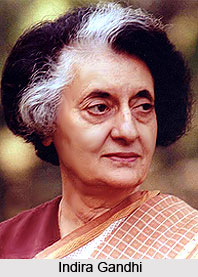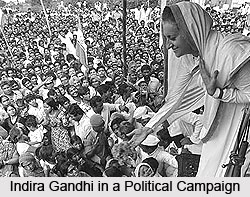Indira Gandhi (1917-84) was one of the most important political women of India. She was India`s only woman Prime Minister and the second woman to head a state in the twentieth century. Mrs. Gandhi`s long tenure in office, from 1966 to 1977 and 1980 to 1984, ended with her assassination on October 31, 1984. Known as the iron lady of India she was one of the most capable Prime Ministers that India had ever seen. Her one political defeat was in 1977, following her declaration of an emergency in India and the suspension of a number of constitutionally guaranteed civil liberties.
 Early Life of Indira Gandhi
Early Life of Indira Gandhi
Indira Priyadarshini Gandhi was born on November 19, 1917. Indira was the only child of Jawaharlal Nehru, an Indian Prime Minister, and Kamala Nehru, a Gandhian and leader of women`s demonstrations in northern India. Indira was raised on politics. Her grandfather, Motilal Nehru, was a leading member of the Indian National Congress since the turn of the century and Kamala Nehru (1899-1936), Indira`s mother, took part in demonstrations and delivered forceful feminist speeches. Indira Gandhi had a hassled childhood as her father was away most of the time for political activities and her mother suffered from frequent illness. At the age of 17, she had to leave her studies at Visva-Bharati University for accompanying her ailing mother to Switzerland for treatment. Growing up in the sole care of her mother, who was sick and hostile from the Nehru household, Indira right from an early age developed a strong protective attitude. She was nineteen years old when her mother died of Tuberculosis. Indira then joined Oxford University and within a year she suffered an attack of pleurisy and had to be admitted to a hospital at Switzerland.
Her grandfather and father continually being engrossed in national politics also made her relations with friends difficult. She had conflicts with her father`s sisters, including Vijaya Lakshmi Pandit, and these continued into the political world. Indira created the Vanara Sena Movement for young girls and boys, which played a small but an important role in the Indian Independence Movement, conducting protests and flag marches, as well as helping Congress politicians circulate sensitive publications and banned materials. In an often-told story, she smuggled out from her father`s police-watched house an important document in her schoolbag that outlined plans for a major revolutionary initiative in the early 1930s.
Six years later Indira married Feroze Gandhi. They had two sons, Rajiv Gandhi and Sanjay Gandhi, but began to live apart as Feroze`s political career became more demanding and Indira was increasingly occupied with the needs of her father. After her father became the Prime Minister, Indira joined him at Delhi as his official hostess and as a legal advisor.
Early Political Career of Indira Gandhi
As her father`s companion, Indira organized his domestic affairs, accompanied him on his several abroad trips, and played the role of official hostess. Older Congress bosses considered her compliant and since they thought they had nothing to fear, made Indira president of the Indian National Congress Party in 1959. Her term of office was uneventful. She also acted as her father`s chief of staff. Nehru was known as a vocal opponent of favouring relatives and friends, so she did not contest a seat in the 1962 elections. As Jawaharlal Nehru died in 1964, Indira, at the urgings of the new Prime Minister Lal Bahadur Shastri, contested elections and joined the Government, being immediately appointed Minister for Information and Broadcasting. She went to Chennai when the riots over Hindi becoming the national language broke out in non-Hindi speaking states of the south. There she spoke to government officials, eased the anger of community leaders and supervised reconstruction efforts for the affected areas. When the Indo-Pakistani War of 1965 broke out, Gandhi was holidaying in the border region of Srinagar. Although warned by the Army that Pakistani insurgents had arrived very close to the city, she refused to move to Jammu or Delhi. She rallied local government and welcomed media attention for reassuring the nation.
 Indira Gandhi as Prime Minister of India
Indira Gandhi as Prime Minister of India
Indira was selected to be the Prime Minister by the elders of the Congress and her candidacy was supported by Congress Party leaders who wanted "a Nehru" in office and believed she would be easy to control. Indira was selected to be the Prime Minister by the elders of the Congress and on January 1966 she was sworn in as the Prime Minister of India. With the backing of the Syndicate, in a vote of the Congress Parliamentary Party, Gandhi beat Morarji Desai by 355 votes to 169 to become the fifth Prime Minister of India and the first woman to hold that position. A large crowd welcomed her. Indira made considerable progress in the office.
In office, Indira Gandhi demonstrated more strength than predicted. By 1972 she was victorious at home, with Congress in power both at the centre and in many of the states; and triumphant abroad having supported Bangladesh in its war of independence against Pakistan. Three years later the high court at Allahabad overturned her election. Mrs. Gandhi refused to accept their decision, declared a state of emergency, and temporarily saved her own power. When she had imposed emergency for 19 months the country made remarkable economic and industrial progress. This was primarily possible because of the end it had put to strikes in factories, colleges, and universities and the repression of trade and student unions. In the process, however, she sanctioned measures that brought about the Congress Party`s first defeat at the centre since Independence. Mrs. Gandhi was in opposition between 1977 and 1980 after which she was returned to power.
Indian Administration during the time of Indira Gandhi
Under Indira Gandhi, the administration became efficient. Tax evasion was reduced by zealous government officials, although corruption remained a major problem. Agricultural and industrial production expanded considerably under Gandhi`s 20-point program, revenues increased, and so did India`s financial standing in the international community. Thus, much of the urban middle class in particular found it worth their while to contain their dissatisfaction with the state of affairs.
She had to travel to distant tribal and rural communities to participate in the revelry of the common people, holding hands with the women, wearing their costumes, laughing with them and joining in their dances. From her childhood, she knew that the rural people of her country had deep inner resources and strength. She saw in them generosity and wisdom which the rich people can`t acquire. She considered them as the true sons to the soil.
Elections of 1980
When the elections were announced for January 1980, she toured the country vigorously, speaking at small and massive gatherings. Finally Indira won with majority. After a few months tragedy engulfed her with the death of her son, Sanjay.
Indira Gandhi on Women and Politics
Indira Gandhi consistently denied that she was a feminist. Speaking at a New Delhi college, she said, "I am not a feminist and I do not believe that anybody should get a preferential treatment merely because she happens to be a woman." But at the same time she referred to women as "the biggest oppressed minority in the world," and said Indian women were handicapped from birth. However, in talking about herself, she denied gender had played a role in either her socialization or her political success. Mrs. Gandhi frequently talked about the importance of women as mothers and homemakers and extolled women`s traditional roles. Interviewed by Meher Pestomji of Eve`s Weekly, Mrs. Gandhi said her greatest fulfilment came from motherhood. Indira said that the emancipation she wanted for the average woman in India was an honourable status in life and that she should be able to exert her influence for the good and benefit of the community.
When asked about the role of women in politics, Mrs. Gandhi urged to create opportunities for women to move into leadership position. In India women vote in substantial numbers and hold high political office yet rarely have they used their vote or office for the advancement of women. Many of the women in power have referenced their gender in political campaigns, referring to themselves as mothers, wives or dutiful daughters, but they have not gendered their political roles. Only a few women have focused specifically on women`s problems. This, she felt, needed to be addressed.
Death of Indira Gandhi
In response to the violation of the sanctity of Golden Temple, on October 31, 1984, two of Indira Gandhi`s own bodyguards Satwant Singh and Beant Singh assassinated her in the garden of the Prime Minister`s Residence at No. 1, Safdarjung Road in New Delhi. They were enraged by the Operation Blue Star, the invasion of the Golden Temple of Amritsar, Sikhism`s holiest shrine. This assault was designed to capture Sant Bhindravale, the leader spearheading a violent movement for an independent Sikh state. She was rushed to the hospital but died on the way in her official car. However she was not declared dead until many hours later. Rajiv Gandhi, Indira`s eldest son, won the following election and remained Prime Minister until his defeat in 1989. Indira Gandhi was cremated on 3rd November 1984, near Raj Ghat and it was her son Rajiv Gandhi who performed her last rites.






